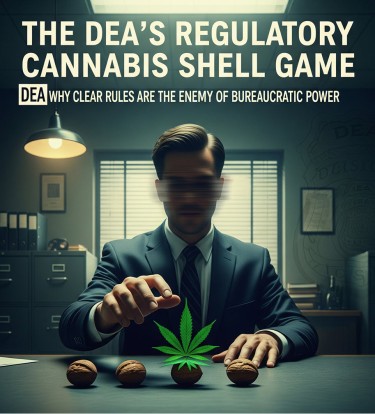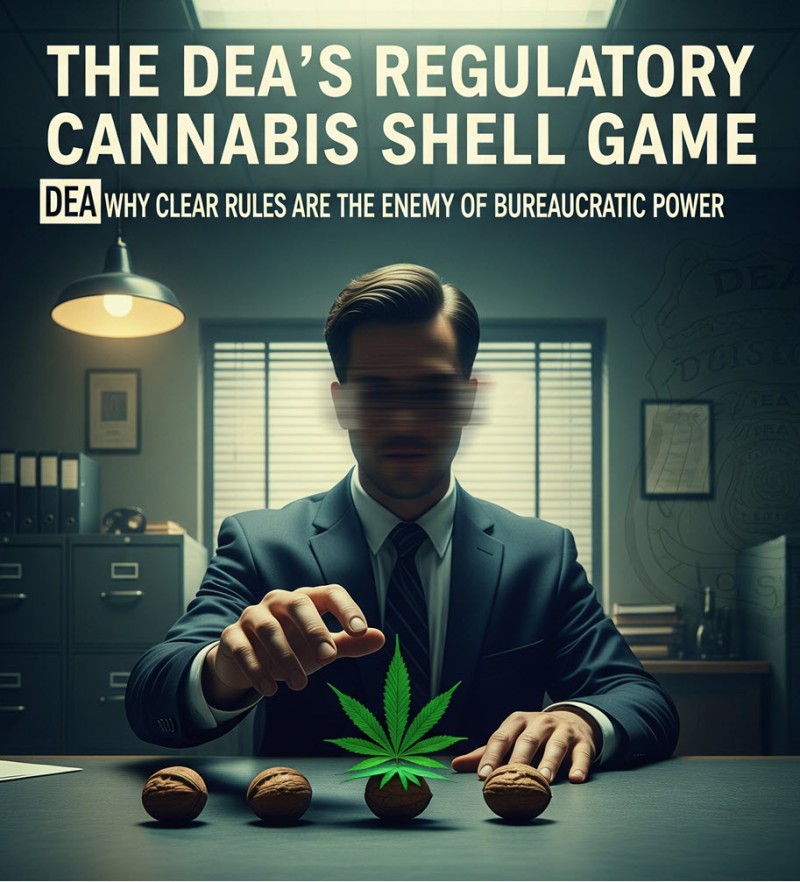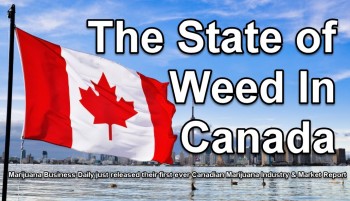
For seven years, MMJ BioPharma has been trapped in what can only be described as regulatory purgatory. They've jumped through every hoop the DEA has thrown at them: built a compliant facility, passed inspections, secured FDA Orphan Drug Designations for Huntington's disease and Multiple Sclerosis treatments, and met every shifting requirement the agency has demanded. Yet they remain stalled, waiting for permission to conduct research that could help suffering patients.
Why? Because the DEA has mastered the art of bureaucratic obstruction through deliberate regulatory ambiguity.
Recent developments under Trump's Executive Order 14192 have exposed this shell game for what it is. The Department of Justice just axed several key DEA rules that have been perpetually "in process," including the Medical Marijuana and Cannabidiol Research Expansion rule that researchers have been waiting for since 2018. Suddenly, all those excuses about "waiting for new regulations" have evaporated into thin air.
This isn't incompetence – it's strategy. The DEA has discovered that the most effective way to maintain control over cannabis research isn't through outright prohibition, but through endless procedural delays and ever-shifting goalposts. Why create clear rules that researchers can follow when you can keep them dangling indefinitely with vague promises of future clarity?
The logic is completely backwards. If cannabis is truly as dangerous as the DEA claims, shouldn't we be rushing to research it? Imagine if the FDA discovered a potentially harmful food additive but then said, "We can't let anyone study this because it's too dangerous – unless they're studying it to prove how dangerous it is." That's essentially the position we've been in with cannabis for decades.
The American public is finally catching on to this charade. We're watching a federal agency that claims to protect public health actively obstruct the very research that could advance medical treatments for devastating diseases. Meanwhile, patients with Huntington's disease and Multiple Sclerosis continue to suffer while bureaucrats play regulatory games.
The Trump administration represents a wild card in this equation. They've promised deregulation, but cannabis has always been a politically tricky issue. With recent leadership changes and shifting political dynamics, we're entering uncharted territory. The question is: will this administration finally force the DEA to stop playing games with people's lives?
The Phantom Rules Strategy: How the DEA Weaponized 'Pending Regulations'
The DEA's most insidious tactic has been what we might call the "phantom rules strategy" – pointing to regulations that are perpetually "in development" as justification for inaction. For years, companies like MMJ BioPharma have been told their applications can't be processed because new rules are coming that will change everything. These phantom regulations have become the bureaucratic equivalent of "the check is in the mail."
The recently withdrawn rules expose this strategy in all its cynical glory. Take RIN 1117-AB83, the "Medical Marijuana and Cannabidiol Research Expansion" rule that was supposed to streamline research applications and create clear timelines. This rule has been "in process" since 2018, dangling like a carrot in front of legitimate researchers while the DEA used its pending status to justify years of delays.
RIN 1117-AB50, concerning DEA hearing regulations, is even more revealing. Following Supreme Court rulings in cases like Axon and Jarkesy that questioned the constitutionality of agency tribunals, this rule was supposedly going to reform the DEA's in-house hearing process. Instead, it became another excuse for inaction while the agency's potentially unconstitutional procedures remained in place.
The beauty of this strategy, from the DEA's perspective, is that it allows them to appear reasonable while being completely obstructive. They're not saying "no" to research applications – they're just saying "wait until we figure out the rules." It's the regulatory equivalent of Lucy pulling the football away from Charlie Brown, except the stakes are human lives and medical advancement.
MMJ BioPharma's case perfectly illustrates how this works in practice. Since 2018, they've been told at various points that their application was being held up because:
-
New research rules were being developed
-
Hearing procedures needed to be reformed
-
Supply agreement requirements were being clarified
-
Quota justification processes were being revised
Each time they met one requirement, another phantom rule appeared on the horizon. It's like a bureaucratic version of Zeno's paradox – no matter how many steps they take toward approval, there's always another regulatory hurdle that keeps the goal perpetually out of reach.
The withdrawal of these rules under Trump's deregulation order has stripped away this protective shield. As MMJ's CEO Duane Boise noted, "There are no more excuses." The DEA can no longer point to pending regulations as justification for delay. Applications must be decided "under the current Controlled Substances Act and existing regulations – promptly and on the record."
This is why the DEA never wanted clear rules in the first place. Clear regulations create accountability. They establish timelines, define requirements, and create legal obligations that agencies must meet. Ambiguous, constantly evolving rules allow maximum discretion and minimum accountability.
The phantom rules strategy has been devastatingly effective at maintaining the status quo while appearing to support research expansion. It's allowed the DEA to claim they support medical marijuana research while systematically obstructing it through procedural manipulation. The recent rule withdrawals have finally called their bluff.
The Logic Trap: Why 'Too Dangerous to Study' Makes No Sense
Let's examine the fundamental absurdity at the heart of the DEA's approach to cannabis research. The agency maintains that cannabis is a Schedule I substance because it has "no accepted medical use" and a "high potential for abuse." Yet when researchers try to study whether cannabis might have medical uses, they're told it's too dangerous to research without jumping through extraordinary regulatory hoops.
This creates a perfect logical trap: cannabis can't have accepted medical uses because we don't allow the research that would establish medical uses. It's like declaring someone guilty of a crime and then refusing to allow a trial that might prove their innocence.
Consider how we handle genuinely dangerous substances in other contexts. When researchers want to study deadly viruses, cancer-causing chemicals, or explosive compounds, we don't ban the research – we create safety protocols. We build secure laboratories, establish strict handling procedures, and require extensive safety training. The danger of the substance actually increases the urgency for research, because understanding dangerous things is how we protect people from them.
Yet with cannabis, the DEA has flipped this logic on its head. Instead of expediting research to better understand potential risks and benefits, they've created a regulatory maze that effectively prevents most research from happening at all. The few studies that do get approved are typically designed to find harms rather than benefits, creating a systematic bias in the available evidence.
This backwards approach becomes even more ridiculous when you consider that cannabis is simultaneously legal for recreational use in multiple states while being "too dangerous" for FDA-regulated medical research. We're allowing millions of people to use cannabis recreationally based on minimal safety data, while preventing researchers from conducting the rigorous studies needed to develop safe, effective medicines.
The case of MMJ BioPharma illustrates this absurdity perfectly. They want to study pharmaceutical-grade cannabis formulations for Huntington's disease and Multiple Sclerosis – devastating conditions with limited treatment options. The FDA has granted Orphan Drug Designations, recognizing the potential medical value and unmet need. Yet the DEA continues to obstruct research into these potential treatments.
Meanwhile, as MMJ's CEO pointed out, the VA is seeking to import cannabis from overseas for research purposes. So cannabis grown in other countries is somehow safer for American veterans than cannabis grown under DEA oversight in American facilities? The logic doesn't just fail – it's actively harmful to American interests and patient welfare.
The "too dangerous to study" position also ignores decades of real-world evidence from places where cannabis use is common and accepted. If cannabis were truly as dangerous as Schedule I classification suggests, we'd see clear evidence of widespread harm in populations with high usage rates. Instead, we see the opposite – countries and states with legal cannabis often show improved public health outcomes compared to prohibition jurisdictions.
The real danger isn't cannabis research – it's the continued suppression of scientific inquiry into a substance that millions of Americans are already using. By preventing rigorous research, the DEA is actually increasing public health risks by forcing people to rely on unregulated products and anecdotal information instead of evidence-based medicine.
The Trump Wild Card: Deregulation Meets Cannabis Politics
The Trump administration's approach to cannabis research represents one of the most unpredictable variables in decades of prohibition policy. Trump's Executive Order 14192 has already blown up the DEA's phantom rules strategy, but what comes next is anyone's guess.
On one hand, the administration's deregulation agenda should theoretically favor streamlined research approval processes. Reducing bureaucratic obstacles, eliminating unnecessary rules, and forcing agencies to make timely decisions all align with stated Trump policy goals. The withdrawal of pending DEA regulations fits perfectly into this framework.
On the other hand, cannabis remains politically complicated, especially within conservative circles where Trump's base includes both libertarian-leaning deregulation advocates and traditional law-and-order constituencies who view any cannabis reform with suspicion.
The recent leadership changes add another layer of uncertainty. Political dynamics that seemed stable just months ago are now in flux, and cannabis policy could shift dramatically based on who has the president's ear on any given day.
What's clear is that the old DEA playbook of endless delays and phantom regulations is no longer viable. Companies like MMJ BioPharma are calling the agency's bluff, and the regulatory shields that protected bureaucratic inaction have been stripped away.
Administrator Terry Cole now faces a moment of truth. He can either approve legitimate research applications under existing law, or continue obstructing medical research and face increasing scrutiny from both patients and policymakers. The phantom rules are gone – it's time for the DEA to make real decisions about real applications from real companies trying to help real patients.
The bureaucratic shell game is over. Let the science begin.







